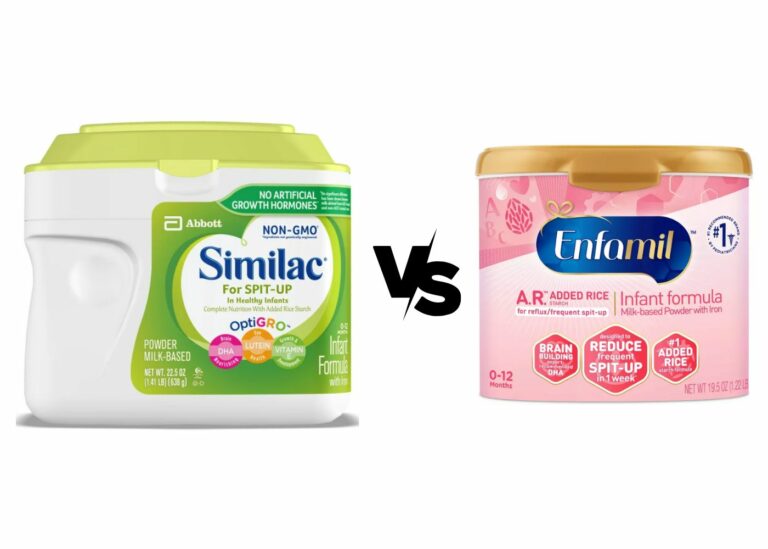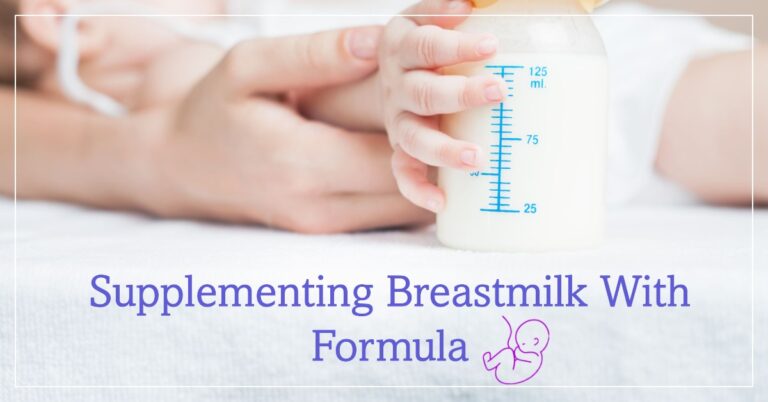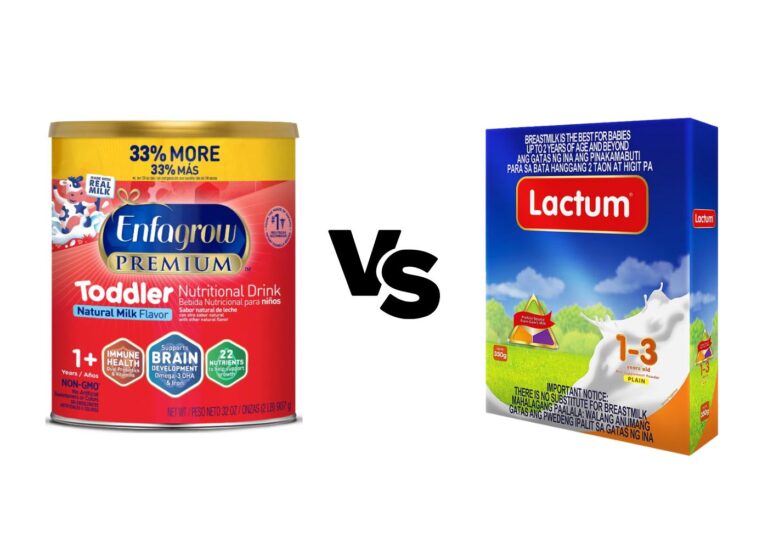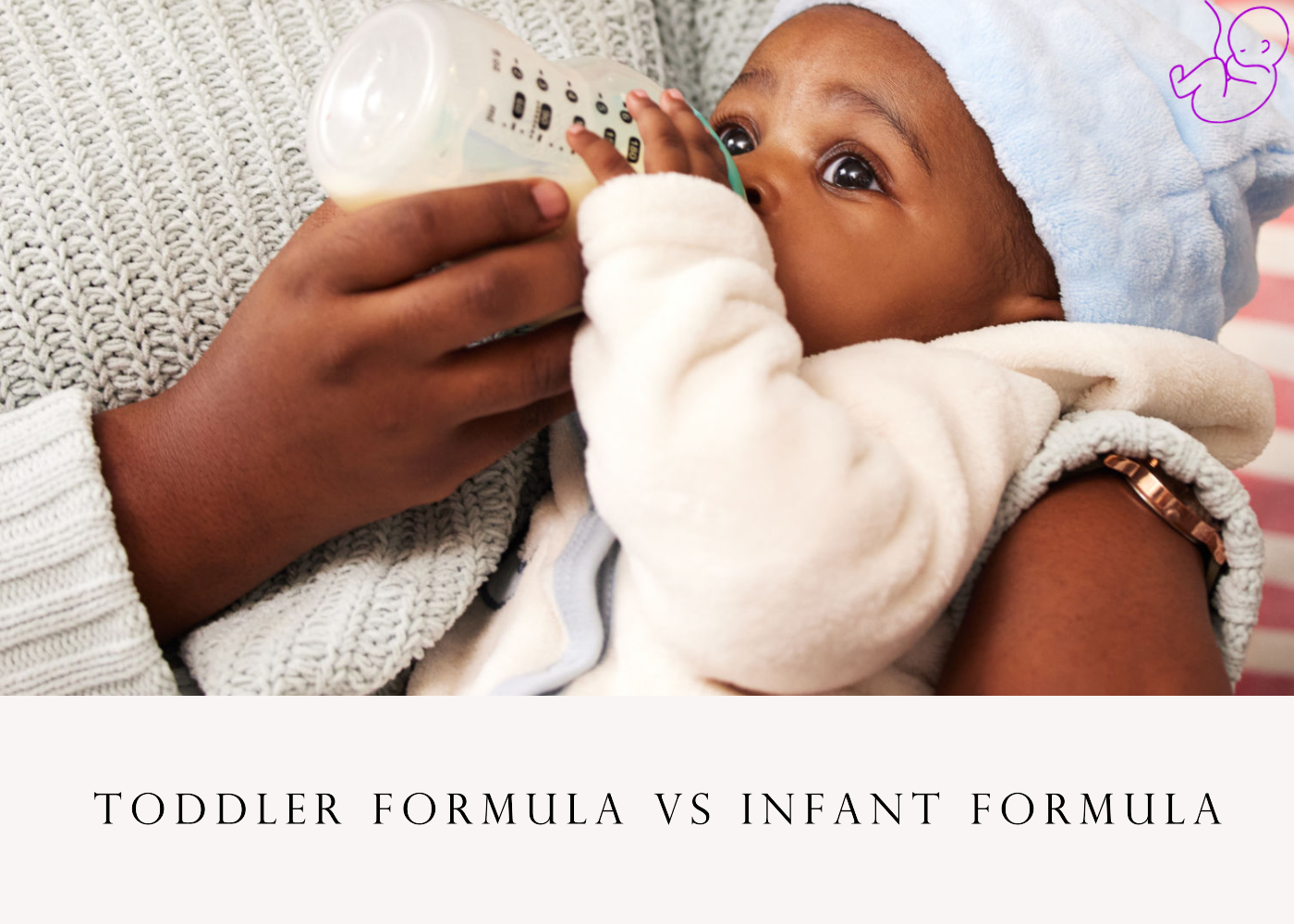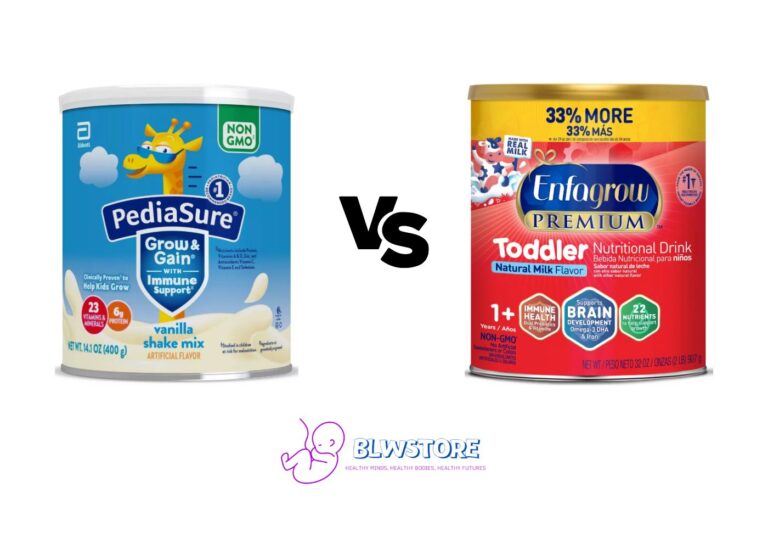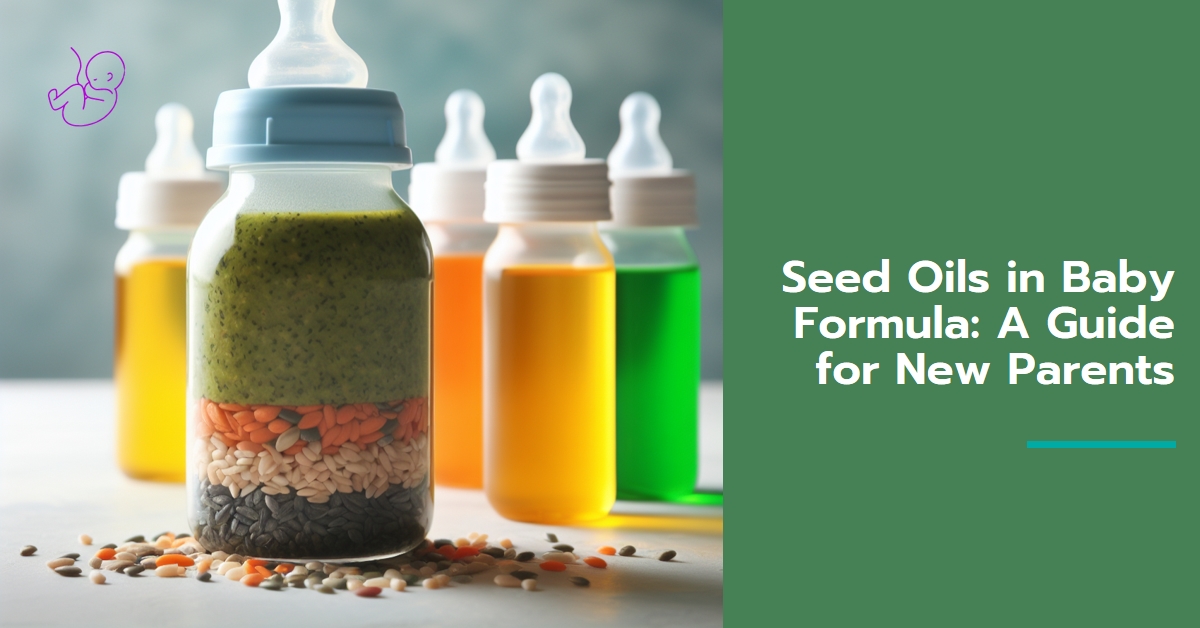
Did you know that approximately 80% of infant formulas in the US contain soy oil?
Since the commercialization of infant formulas, seed oils have been key ingredients, as the types of lipids they contain resemble those found in breast milk.
In this article, our goal is to educate new parents interested in this topic and provide strategies for choosing formulas that are as healthy as possible and contain seed oils that are not as harmful.
Related read: Best Formulas With No Harmful Seed Oils
Our Experience and Short Answer
Even though it’s extremely difficult to find any infant formula without vegetable oils, you can find brands that do not have such a high proportion of oils, or that are not so processed, or that are not so harmful.
To achieve this, choosing formulas that use more dairy fat is recommended. This translates into choosing those with whole milk, instead of skimmed (Kendamil and Nannycare are two examples).
In addition, choosing formulas that have organic oils and avoid as many seed oils as possible is better.
Formulas that have coconut oil and palm oil (not palm olein though) are better nutritionally, as they are not seed oils.
Coconut oil has been demonized, but it has been shown to have many benefits in a balanced diet.
Palm oil is also quite controversial, especially because of its impact on the environment, but by choosing an organic formula, you avoid this.
In short, choosing an organic formula that does not include soybean oil and has coconut and palm oil is a nutritionally more complete and healthier choice for your baby in the long run.
How did seed oils become a common ingredient in baby formulas?
Let’s go back a bit to the early days of infant formula. The primary aim has always been to mimic mother’s milk as closely as possible to ensure the health and growth of infants. Mother’s milk is nature’s perfect food, providing babies with the right balance of nutrients, including proteins, fatty acids, carbohydrates, vitamins, and minerals. Among these nutrients, certain types of fats – essential fatty acids – play a critical role in the baby’s brain and nervous system development.
Now, why are seed oils the chosen torchbearers for these essential fats? The answer lies in the profile of these oils. They come loaded with two essential fatty acids infants need– linoleic acid (Omega-6) and alpha-linolenic acid (Omega-3). The body can’t produce these fatty acids independently; hence, they need to be obtained from the diet, hence the term ‘essential’. Most seed oils contain many beneficial fatty acids, making them a seemingly perfect addition to baby formula.
Moreover, the use of seed oils in baby formulas can be traced back to their cost-effectiveness, ease of processing, and wide availability. As industrial processes advanced, refining techniques improved, and seed oils became more suitable for use in infant formulas.
Now that we’ve gotten this historical perspective let’s shift gears a bit and see how the tables have turned.
Despite the initial intentions and benefits of using seed oils, new light has been shed on their potential dangers for infants.
Are seed oils harmful to infants?
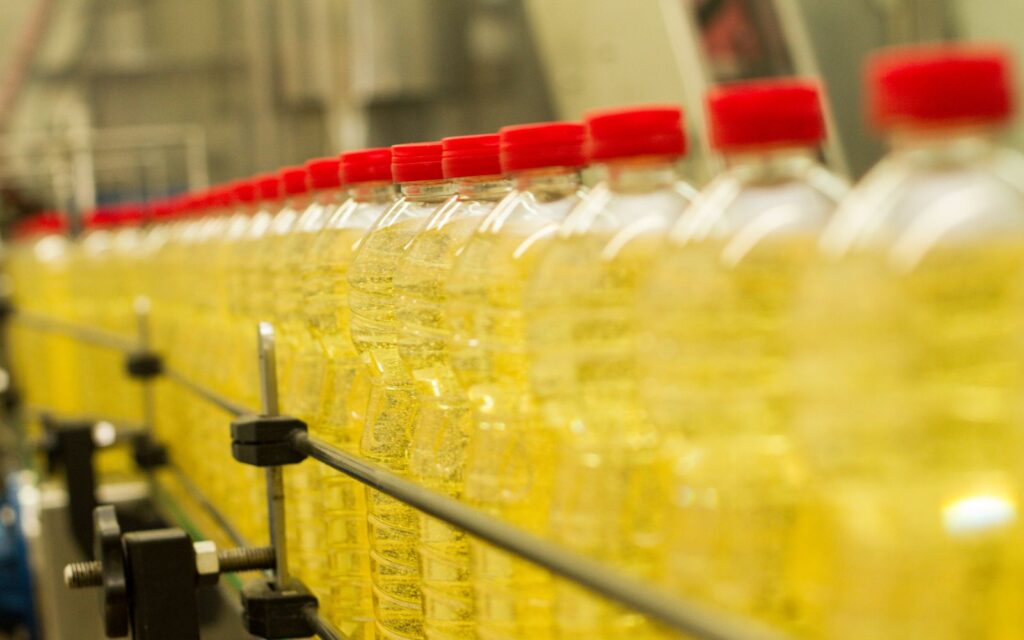
Here’s the balanced answer: seed oils, as with most food components, when provided in the right amounts, are generally safe and can offer certain nutritional benefits. However, they may present certain risks when consumed or overly relied upon as the primary source of certain nutrients.
Nutritional Benefits of Seed Oils:
- High in Essential Fatty Acids: Seed oils contain substantial amounts of essential fatty acids like alpha-linolenic acid (ALA), a type of omega-3 fatty acid, and linoleic acid (LA), a type of omega-6 fatty acid. These fatty acids are needed for infants’ brain and nervous system development.
- Rich Source of Vitamin E: Many seed oils are rich in vitamin E, an antioxidant that protects the body’s cells and helps maintain healthy skin and eyes.
Potential Risks of Seed Oils:
- Omega-6 to Omega-3 Ratio: Many seed oils have a high omega-6 to omega-3 fatty acids ratio. While both are essential to the body, an imbalance, with omega-6 consumed in excess, is suspected to promote inflammation and related diseases in the long term. Baby formulas, however, control the ratios to ensure a balanced intake.
- Allergic Reactions: Certain seed oils, like soybean and sesame oil, can cause allergic reactions in some infants. Always monitor your baby for signs of an allergic reaction when introducing a new formula.
While seed oils can offer certain benefits as part of a balanced diet, their use in infant formula should be balanced and monitored.
Are there any baby formulas without seed oils on the market?
The short answer is no. Nearly 99% of infant formulas on the market contain seed oils. However, some formula brands use the best type of oils with the least amount of processing possible, which are the ones we should give our babies if breast milk is unavailable.
Some of the best formulas, according to this information, are:
- Kendamil
- Holle
- Hipp
- Bobbie
- Byheart
- Nannycare
- Kabrita
- Jovie
While it is true that all of these formulas use seed oils, none of them contain soy oil, and the way of extracting the oils is as natural as possible.
Related read: Baby Formulas without Soy Oil
If we choose organic formulas, we will also be avoiding possible pesticides and heavy metals that can be detrimental to our children in the long term.
As always, the more natural, the better.
Comparison Chart Between Popular Formulas and Their Vegetable Oils
Remember, organic>non-organic | Coconut>Organic Palm>Rapseed>Palm>Sunflower=Safflower=Canola>Soy
| Name of the formula | Organic | Palm | Palm Olein | Soy | Canola | Coconut | Sunflower | Safflower | Rapeseed |
|---|---|---|---|---|---|---|---|---|---|
| SIMILAC FORMULAS | ✘ | ✘ | ✘ | ✔ | ✘ | ✔ | ✔ | ✔ | ✘ |
| ENFAMIL FORMULAS | ✘ | ✘ | ✔ | ✔ | ✘ | ✔ | ✔ | ✘ | ✘ |
| KENDAMIL | ✔ | ✘ | ✘ | ✘ | ✘ | ✔ | ✔ | ✘ | ✔ |
| BOBBIE | ✔ | ✘ | ✘ | ✘ | ✔ | ✘ | ✔ | ✔ | ✘ |
| BYHEART | ✔ | ✘ | ✘ | ✘ | ✘ | ✔ | ✔ | ✘ | ✔ |
| NANNYCARE | ✘ | ✘ | ✘ | ✘ | ✘ | ✘ | ✔ | ✘ | ✔ |
| KABRITA | ✘ | ✘ | ✘ | ✘ | ✘ | ✔ | ✔ | ✘ | ✔ |
| HOLLE | ✔ | ✔ | ✘ | ✘ | ✘ | ✘ | ✔ | ✘ | ✔ |
| HIPP | ✔ | ✔ | ✘ | ✘ | ✘ | ✘ | ✔ | ✘ | ✔ |
This table makes Kendamil Organic the most nutritionally complete formula currently. Something we have been saying for a long time.
Is it possible to make homemade baby formula without seed oils or infant formula?
Yes, making a homemade baby formula is possible without using seed oils or commercial infant formula, but it’s critical to approach this with caution. A baby’s needs are specific and making a homemade formula that meets all the nutritional requirements can be challenging. Let’s delve more into this topic.
The Key Nutritional Requirements: When it comes to feeding an infant, crucial nutritional and safety components must be met. The main challenge is how to achieve these when preparing a DIY formula without seed oils, along with possible cross-contamination.
The Alternative Ingredients:
While seed oils are rich in certain fats and easy to incorporate into a liquid formula, alternative sources of these essential nutrients are available for your baby’s development. Foods like avocados, chia seeds, and extra virgin olive oil are each a good source of healthy fats, omega-3s, and vitamins.
The Safety Factor:
The idea of a homemade infant formula might sound tempting, especially for those who want to avoid seed oils and other common ingredients found in commercial infant formulas. However, it’s crucial to remember that newborns have very delicate systems. The American Academy of Pediatrics (AAP) warns against homemade infant formula, primarily due to the concern that it could lead to nutrient deficiencies and potentially harmful food-based bacterias.
In terms of safety, commercial infant formulas undergo rigorous testing and have to meet strict nutritional guidelines before they can be sold. On the other hand, a homemade formula cannot offer the same reassurances.
While it’s possible to create a homemade baby formula without seed oils, it’s a task surrounded with challenges and potential for nutritional deficiencies. Always consult a healthcare professional before attempting to make and use homemade baby formula.
What are the Most Used Oils in Baby Formula?
Alternatives to seed oils, such as coconut oil or palm oil, have been criticized for their high saturated fat content. However, the more research is done, the better these two oils perform. Coconut oil is high in saturated fats, but they have been proven to be healthier than other fats in a balanced diet without sugars and trans fats.
Here’s a table with the most common oils in formula:
| Vegetable Oil | Type | Features |
|---|---|---|
| Coconut Oil | Non-Seed Oil | Rich in lauric acid, MCTs, supports brain health, weight management, heart-friendly, high in healthy saturated fats, Smoke Point: Medium |
| Rapeseed Oil | Seed Oil | Rich in omega-3 fatty acids, high in Vitamins E & K, low in saturated fat, high smoke point |
| Canola Oil | Seed Oil | Rich in Omega-3 & Omega-6, high in unsaturated fats, contains ALA, Smoke Point: High |
| Sunflower Oil | Seed Oil | Contains oleic and linoleic fatty acids, delivers fat-soluble vitamins (A, D, E, K), Smoke Point: High |
| Safflower Oil | Seed Oil | High in polyunsaturated fats, supports immune system, lowers heart disease risk, Smoke Point: High |
| Soy Oil | Seed Oil | Contains essential fatty acids, cholesterol-free, source of Vitamin E, Smoke Point: Medium |
| Palm Oil | Non-Seed Oil | Rich in saturated fats, supports brain health, contains beta-carotenes, Smoke Point: Low |
For more information, read our article on vegetable oils in baby formula.
Last Words
Now that we’ve shed light on the association between seed oils and infant formulas, it’s important to note that while seed oils do have a ubiquitous presence in these products, it’s not purely bad news.
The industry view is that when used within acceptable limits, these oils can provide the needed dose of essential fatty acids that your little one requires.
But does this mean there aren’t any reasons to be concerned? Absolutely not. Like most things in life, even seed oils are best used in moderation. The potentially harmful effects of seed oils, like inflammation and digestive issues, come into play when these oils are consumed excessively.
As such, limiting the consumption of these oils is key, which is advice that isn’t exclusive to just infants but applies to everybody, irrespective of age. So, remember this– it’s all about balance.
Remember, every baby is unique. What works wonderfully for one infant might not sit too well with another. The golden rule is customizing your baby’s diet based on observed patterns, reactions, and professional advice.
To finish off, while the topic of seed oils in infant formulas may seem convoluted and slightly overwhelming, knowledge is power. The more you understand what goes into your baby’s food, the better you can navigate the available choices. Be proactive, seek professional advice, and don’t be afraid to ask questions.
If you have extra questions, feel free to send them to us at [email protected], and we’ll be happy to help you.
We’re Maria and Alberto, a married couple and educators who are nutrition enthusiasts. Even before we had kids, we were already crazy about nutrition.
We’d read scientific articles, watch videos from nutritionists, and spend hours listening to nutrition podcasts.
Today, we continue doing this, but in a different way, as we’ve learned to sift through the noise and trends. Nutrition, like any other field of knowledge, the more you read and learn, the more you develop a comprehensive understanding of reality, and that’s what has happened to us.
Before having our first child, we focused on learning everything we could about child nutrition, using the same techniques we had already employed, backed by our extensive knowledge in nutrition.
Our mission is to help other parents with their children’s nutrition, to help them become the best versions of themselves.
If we are what we eat and drink, which is absolutely true, let’s do it right!


